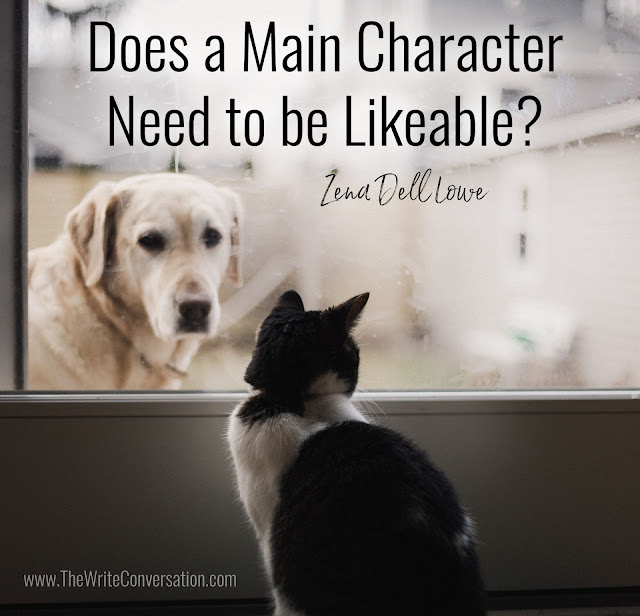by Zena Dell Lowe @ZenaDellLowe
Anyone who's ever studied the craft of writing will have heard the adage that a main character must be likeable. For the most part, this is true, because audiences don't tend to get emotionally invested in characters they don't like. If our readers don’t care, then the stakes will mean nothing to them. Any story that fails to create an emotional bond between the MC and the reader ultimately fails altogether.
The Problem with Likeability
The problem is that not all characters are likeable -- at least, not at the start. This is especially true if we're trying to tell a story where the whole point is to show a character who changes over the course of the telling. Any story that starts with an antihero, for example, necessarily becomes problematic. By their very nature, antiheroes are selfish. They can possess other undesirable traits as well, such as cowardice or a cloudy moral compass. These “bad” character traits cannot be condoned, and they certainly aren’t “likeable.” In fact, we’ll have to work to redeem our antihero over the course of the story by making him aware of his character defects, and then forcing him to overcome those traits. The purpose of this kind of story is to change that character’s essential nature so that they become selfless or brave as a result of the crucible they’re going through. They might end up likeable, but they wouldn’t have started out that way.
The Basic Rule of Thumb
But this begs the question, if a main character is supposed to be likeable, what does this mean for the writer who has this kind of character at the center of their story? Well, it means we go back to the reason this adage exists in the first place: It’s not so much about likeability as it is about forging an emotional connection between your main character and your audience. And there are other ways to accomplish this besides making your character likeable.
Making a Character Sympathetic
Instead of trying to make your character likeable, you might try making them sympathetic. A sympathetic character is one who, though we don’t “like” them per se, we do “feel” for them in some way given their current situation or life circumstances. The idea is to play upon an audience’s ability to empathize with someone who might be a bit rough around the edges, but who has had a rough enough time about it that we understand why they’re this way and are therefore willing to invest emotional energy into that character anyway.
For example, in the film As Good as It Gets, Jack Nicholson plays the character of Mr. Udall, a man that is so unlikable that he can even ruin a sweet little old lady's day. From the moment we meet him in the opening of the film, he shows himself to be a fairly horrible human being. In short order, he comes across as sexist, racist, rude, homophobic, selfish, a bad neighbor, and uncaring. This last part is made extra clear when we see him put a cute little dog down a garbage shoot. What kind of cretin does that to a dog? Mr. Udall, that’s who. There’s no doubt in our minds that he’s a hateful human being, and yet, audiences loved him. Why?
Well, because it’s not about likeability so much as it is about creating that emotional bond. In the case of Mr. Udall, we go from this introduction immediately into his apartment, where we suddenly gain insight into WHY he’s so offensive. He flips the light switch up and down five times. Goes into the bathroom and does the same. Throws brand new leather gloves into the garbage, and begins washing his hands in scalding hot water, five times total, and each time using a brand-new bar of expensive soap. That’s when we realize, “Oh, he’s sick.” He’s got OCD to a debilitating degree. And this realization makes us have sympathy for him. Yes, he’s rough around the edges. Yes, he comes across a Grade-A jerk. But we assume there’s more to him than meets the eye, because of his situation. So, we’re willing to extend grace to him, simply because we find him sympathetic. We’re willing to give him a chance, to emotionally invest in his journey. Thus, we bypass the rule of likeability by making him sympathetic instead.
Making a Character Intriguing
But there’s yet another way to draw readers into a story: Try making the main character so intriguing that the audience can’t possibly look away. Intriguing characters are those who may not be likeable OR sympathetic. They may even possess psychotic character traits, commit heinous crimes, or otherwise be repulsive to us. Nevertheless, they’re so fascinating to us that we still get hooked into their story. In this case, the bond you create between the main character and the audience is one of sick captivation, like watching a train wreck unfold.
A perfect example of this is Matt Damon's character from The Talented Mr. Ripley, based on the novel by Patricia Highsmith. Ripley is not a good man. His most prominent qualities are shared by many psychopaths: he’s remorseless, manipulative, arrogant, deceitful, calculating, and murderous. Nothing about his behavior could be called “likeable.” Nothing about him is “sympathetic.” He’s a stone-cold serial killer, and yet, he’s fascinating to us. We get sucked in because he's a master chameleon, and we can’t seem to stop watching to see what’s going to happen. What will Ripley do next? Make the main character intriguing enough and readers will feel compelled to stay involved in the story out of a desperate need to see how it all shakes out.
ConclusionThe moral of the story is that you must create an emotional bond between your character and the audience. Historically, the easiest way to do that has been to create a character who is likeable. However, some stories have at their centers a character who is unlikeable. When that happens, writers can still accomplish this objective by making their main character either sympathetic or intriguing.
TWEETABLE
Zena has worked professionally in the entertainment industry for over 20 years as a writer, producer, director, actress, and story consultant. Zena also teaches advanced classes on writing all over the country. As a writer, Zena has won numerous awards for her work. She also has several feature film projects in development through her independent production company, Mission Ranch Films. In addition to her work as a filmmaker, Zena launched The Storyteller’s Mission with Zena Dell Lowe, a podcast designed to serve the whole artist, not just focus on craft. In 2021, Zena launched The Storyteller’s Mission Online Platform, where she offers advanced classes and other key services to writers. Zena loves story and loves to support storytellers. Her passion is to equip artists of all levels to achieve excellence at their craft, so that they will truly have everything they need to change the world for the better through story.
To find out more about Zena or her current courses and projects, check out her websites at WWW.MISSIONRANCHFILMS.COM and WWW.THESTORYTELLERSMISSION.COM


Thank you Zena for this great post. It's given me insight on which way to take my anti-heroine, something I'd been putting off. lol
ReplyDeleteAppreciate you. :)